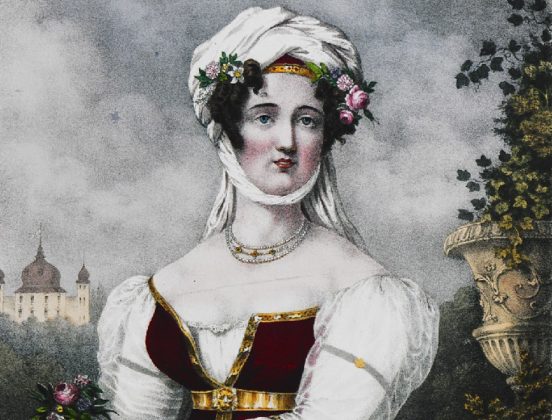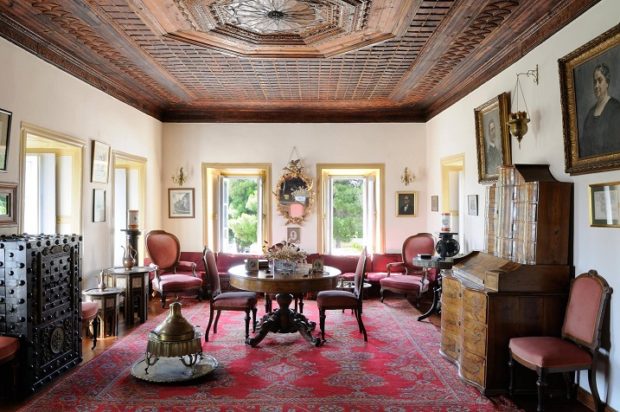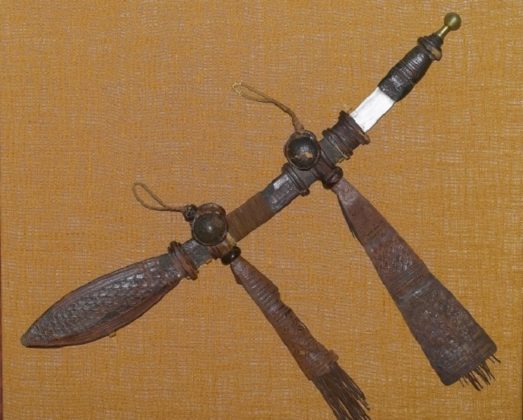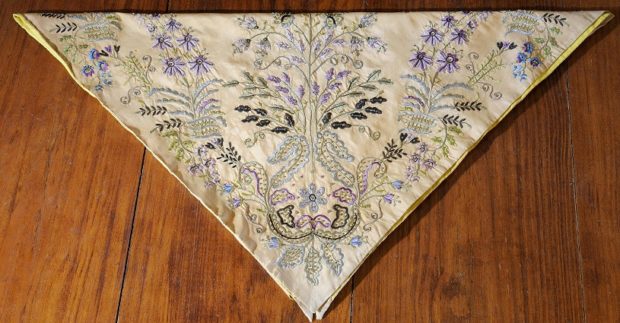So Who Was Bouboulina?
For one, she was a tough cookie.
According to legend, she was born in a Turkish prison in Constantinople (where her father had been imprisoned), she became the Capetanissa of her own fleet, gave birth to seven children, survived two husbands, became the scourge of the Turks during the Greek War of Independence, was killed by accident, or not, when a rival family shot up her house during a vendetta, and after her death she was named an admiral in the Russian navy.
And among all those mustachioed captains of the Revolution, she was the only Capetannisa.

Portrait of Bouboulina by Friedel. Photo credit: The Bouboulina Museum
“To me she was a phenomenon in her own right, a pioneer of her time, whose story inspired writers, poets and artists throughout Europe,” her descendant and director of the Bouboulina Museum in Spetses, Pavlos Demertzis-Bouboulis, told The Greek Reporter.
“A born leader, who commanded her own fleet and her own private army during the revolution and, until recently, was the first and only woman in world naval history to hold the title of Admiral. The fact that she managed all of this in early 19th century Greece, a land dominated by men and patriarchal tradition, is astounding.”
Laskarina Bouboulina, maiden name Pinotsis from Hydra, was born presumably in the Constantinople prison in 1771, where her father Stavrianos has been imprisoned for participating in the Orlov revolt against the Ottomans. After he died in prison, Laskarina and her mother Paraskevo moved to Spetses when she was four years old, where her mother married Captain Dimitri Lazarou-Orlov, who added the Orlov to his name to commemorate his participation in the Orlov revolt, and Laskarina grew up with her half-siblings and became a tomboy: riding, swimming, fishing, sailing, listening to rumors about a Greek revolt against their Ottoman overlords, and singing klepht songs.

Pavlos Demertzis-Bouboulis in front of a painting of Laskarina Bouboulina in naval battle. Courtesy of Pavlos Demertzis-Bouboulis
Her stepfather encouraged her, and because he was a Russophile and admired the empress Catherine and the advancement of women, he also gave her access to his library, which contained all the fruits of the Enlightenment, including books by Schiller and Voltaire.
So Laskarina was both a firebrand, and a learned woman, rare for her age.
But still she was a woman of the sea, so she went on to marry two sea captains, one of them a Dimitri Bouboulis, making her Bouboulina.
Only she lost them both during pirate raids, leaving her a fleet, a tribe of children (a family of ten, including three adopted children), and a fortune, that she increased by becoming a partner in several ships and building more of her own, including the fabled Agamemnon, with 18 cannons, the largest Greek ship that fought in the Revolution.
But even before the Revolution she had her run-ins with the Turks.

Bouboulina attacking Nafplion. Photo credit: The Bouboulina Museum
In 1816, they tried to seize her property because her husband had fought with the Russians against them during the Turko-Russian wars. She thwarted that, with the help of the Russian ambassador to Constantinople, but by then she was already working with the Filiki Eteria that was planning to overthrow the Ottomans in Greece. Her ships were often used to smuggle food, weapons and munitions to Spetses.
And in early 1821, twelve days before the Revolution was officially declared, she was the first to raise the flag of the Revolution, a modified Greek flag, from the mast of the Agamemnon, and then sail with eight ships to launch a naval blockade of Nauplion and begin her legend.
“From the start of her command, she displayed tremendous powers of leadership,” records the encyclopedia.com. “Assisted by her sons and brothers, she commanded a small fleet that distinguished itself on many occasions, including the naval blockade of Monemvasia and Nauplia.”
She often sailed her ships where they were needed, including at the siege of Tripolis.
“Bouboulina brought her ships to assist the besieged Greek insurgents. After the fierce battle ended, she was the first of the liberating forces to enter the relieved town, doing so in dramatic fashion on horseback.”
In fact, she cut a dashing figure.
“Indeed, it was not uncommon for her enthusiasm and courage to motivate her to temporarily abandon her flagship and venture ashore. Fortunately, her lieutenants were able to maintain discipline and follow her orders in her absence. Whether on sea or land, she was universally respected both by her own crews and by Greek soldiers of the liberated territories as their Capetanissa, the brave, resolute woman naval commander of the Free Hellenes.”

View of the inside of Bouboulina’s house. Photo credit: The Bouboulina Museum
One eyewitness historian, Anargyros Hatzi-Anargyrou, says, it was “indeed the very rare event in the history of nations of a woman to take up arms, a very rich woman who decided to offer her ships, her money, and her sons as a sacrifice to the altar of her country.”
And she “was indeed lionhearted. As I recall, on her own vessel, she alone gave the orders for the boats to attack a fort. They immediately attacked, but a rain of bullets and cannon fire from coastal fortifications made her brave lads fall back for a moment.’
‘Like an angry Amazon watching the battle from the side of her boat she ten shouts: ‘Are you women, then, and not men?! Forward!”
During the battle of Argos, her eldest son was killed in battle and after the fall of the city to the Greeks, she sent word back to Spetses that said simply: “My son is dead, but Argos is ours.”
But along with her courage and toughness, there are also reports of her compassion—a rare thing in those savage times.
“After the town of Tripolis was captured by the Greeks, she determined to save as many lives as possible through political compromise. A skilled diplomatic negotiator, she worked out a deal with the Turkish military commander, Elkas Aga, where Greek ecclesiastical leaders were exchanged for the harem of the Turkish vizier and governor of the Peloponnesus, Hourshid Pasha.”

Bouboulina’s sword. Photo credit: The Bouboulina Museum
Unfortunately, not many of the Greek soldiers, battle-hardened veterans of the bloodshed, “who thought the only good Turk was a dead Turk,” liked the arrangement.
“Determined to deal with their anger and opposition, she asked that the soldiers assemble to hear her side of the issue. Speaking to them not as a revered Capetannisa but as a middle-aged widow and mother, Bouboulina addressed them as ‘my children’ so as to share her personal grief with those assembled. She mentioned that it had been ‘barely eight days since my son John was killed by the Turks,’ while remaining vehement that they must seek no revenge and that no harm should come to the Turkish harem women.”
She allowed the soldiers to take the jewels and coins of the women, but insisted that no harm come to the women themselves.
“Whoever attempts to do so will have first to pass over my dead body,” she told them.
Most obeyed, some set fire to the fortress where the women had been kept, but Bouboulina was able to contact the local Greek commanders, and join them with her sword out, to make sure the harem women were allowed safe passage to a chartered vessel that brought them back to Asia Minor.
“Over the course of the war Bouboulina was considered an equal with other revolutionary commanders and was involved in planning their strategy,” says femalesoldier.com. “She became good friends with General Theodoros Kolokotronis and their children later married.”
She also had a sense of humor about the myths and legends that soon sprang up around her: when she was told that back in Paris they considered her beautiful as well as courageous, she started laughing.
And she baked her own paximadia to avoid getting poisoned.

Bouboulina’s embroidered headscarf. Photo credit: The Bouboulina Museum
After the war, she settled in Nauplion, the new Greek capital, until 1824 when, predictably, the Greeks turned on each other and Kolokotronis was thrown in jail, Bouboulina was jailed twice, and finally exiled to Spetses, with her fortune depleted from fighting in the war.
She met her end when the Koutsis family took offence that her son Giorgo had eloped with their daughter, and when she confronted them from her balcony, she was shot in the head and apparently died on the spot.
After her death, the Czar gave her the honorary rank of admiral in the Russian navy, the first woman so honored in history, and today, of course, she is a national hero.
“Furthermore, if you are willing to move past the Greek Revolution,” says her descendant Demertzis-Bouboulis, “and also consider modern day civil and equal rights moments and the struggle for the emancipation of women throughout the world, I believe her story could not be more relevant today.”















0 comments